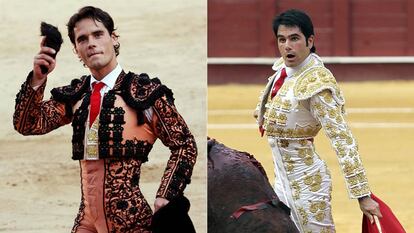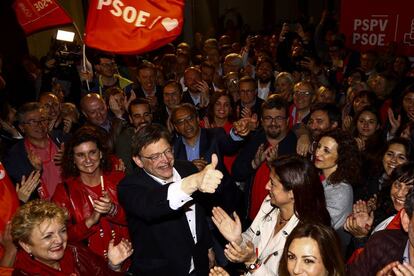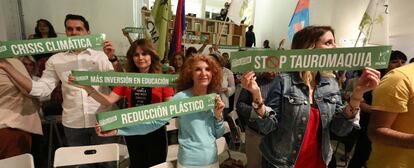What you might have missed at the 2019 Spanish general election
The result of the Senate vote, the fate of bullfighters who stood for seats in Congress and the disappointing performance of Spain’s animal-rights party may have passed you by

The big news on Sunday was that the Socialist Party (PSOE), led by Pedro Sánchez, won the highest number of seats at the Spanish general election. But the outcome of the vote also had an impact on other issues. Here is a roundup of other important news concerning the results that you might have missed.
High-profile losses
The outcome of Sunday’s vote has meant that some well-known figures are losing their congressional seats, particularly within the Popular Party (PP), which lost 71 seats on Sunday – a historically poor result for the conservative group. These include Mari Mar Blanco, sister of Miguel Ángel Blanco, a PP councilor who was kidnapped and executed by the Basque terrorist group ETA in July 1997. Blanco, who now heads the Terrorism Victims Foundation, had been a PP deputy since 2016.

Also out is Rita Bosaho, a Podemos deputy who gained media attention in December 2015 when she became the first black person to sit inside Spanish Congress. Bosaho was running as number three for Alicante province, where Podemos only earned two seats.
No bullfighters in Congress
None of the bullfighters who were running with the PP and Vox have made it into Congress. The far-right Vox, whose defense of hunting and bullfighting has been one of its key policies, had a matador named Serafín Marín on its Barcelona list. Instead, Vox’s only seat representing Barcelona province will go to an atypical party member: Ignacio Garriga,whose father is Catalan and mother is from Equatorial Guinea.
The PP had also enlisted toreros: Salvador Vega for Málaga and Miguel Abellán for Madrid. Neither one has made it into the lower house.
Valencia election
Besides voting in the general election, residents of the Valencia region also cast their ballots for their regional representatives on Sunday. The Valencia branch of the Socialist Party, the PSPV-PSOE, received the highest number of votes, representing its first victory in 28 years in a region that had been long run by the PP. In 2015, the PP won the most seats but an alliance between the Socialists, Podemos and the regional Compromís ushered in a leftist executive. Regional premier Ximo Puig has opened talks in a bid to renew the alliance.

Historic win in the Senate
The Socialist Party won an absolute majority in the Senate, breaking 25 years of PP control. The PSOE now holds 121 seats in the upper house, a significant rise from the 43 the party took at the 2016 polls. In addition to the senators elected by popular vote, the PSOE has 18 others who were appointed by the regional legislatures. This gives Sánchez’s party a total of 139 seats in the 266-seat Senate, where the absolute majority is 134. Not since 1993 has the PSOE been the most-voted party in the Senate.
As in Congress, the PP suffered a crushing defeat in the Senate vote, losing 74 seats to be left with just 56 seats. The remaining seats were won by the Catalan Republican Left-Sovereigntists (ERC-Sobiranistes) (11 seats), the Basque Nationalist Party (PNV) (9), Ciudadanos (Citizens, 4), Navarra Suma (3), Junts per Catalunya (Together for Catalonia) (2), Gomera Socialist Group (ASG) (1) and EH Bildu (1) from the Basque Country.
Animal-rights group misses out on a seat
The Animalist Party Against Mistreatment of Animals (PACMA) once again missed out on a seat in Congress. Although the group won 1.25% of the vote, the equivalent of more than 300,000 ballots, the party did not win a seat in Congress because support was spread out across the country. Spain uses the D’Hondt method of proportional representation, according to which some votes carry more weight depending on where they are cast.

“How can you justify the fact that the 50,000 people who voted for the Regionalist Party of Cantabria (PRC) have representation and the 300,000 who voted for PCMA are left out again?” asked PACMA candidate Laura Duarte.
Despite the disappointing result, the party is optimistic about their chances at the upcoming European elections.
English version by Susana Urra.
Tu suscripción se está usando en otro dispositivo
¿Quieres añadir otro usuario a tu suscripción?
Si continúas leyendo en este dispositivo, no se podrá leer en el otro.
FlechaTu suscripción se está usando en otro dispositivo y solo puedes acceder a EL PAÍS desde un dispositivo a la vez.
Si quieres compartir tu cuenta, cambia tu suscripción a la modalidad Premium, así podrás añadir otro usuario. Cada uno accederá con su propia cuenta de email, lo que os permitirá personalizar vuestra experiencia en EL PAÍS.
¿Tienes una suscripción de empresa? Accede aquí para contratar más cuentas.
En el caso de no saber quién está usando tu cuenta, te recomendamos cambiar tu contraseña aquí.
Si decides continuar compartiendo tu cuenta, este mensaje se mostrará en tu dispositivo y en el de la otra persona que está usando tu cuenta de forma indefinida, afectando a tu experiencia de lectura. Puedes consultar aquí los términos y condiciones de la suscripción digital.








































